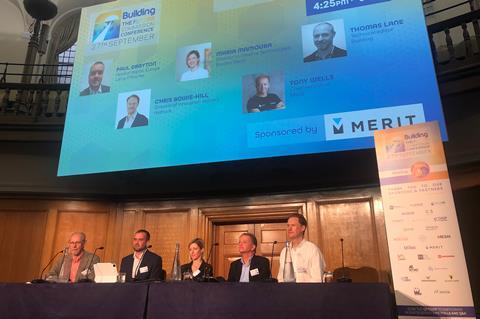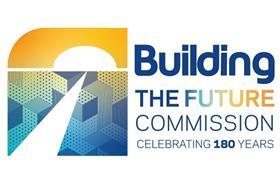Merit’s Tony Wells tells conference industry needs radical rethink
The construction industry has more than a century of progress to catch up on and should not be “afraid of disruption”, according to the boss of an offsite manufacturing firm.
Tony Wells, chief executive of Merit, invoked economist Paul Krugman in identifying productivity as the key challenge facing the sector.
“Productivity isn’t everything but in the long run it is almost everything,” he said, quoting the Noble Prize winner.
He told ∫√…´œ»…˙TV‚Äôs ∫√…´œ»…˙TV the Future Commission conference that while manufacturing had gone through four industrial revolutions, the construction sector had ‚Äúsort of checked out around the 1910s‚Äù.

“We need to get back and address that and catch up on 120 years in one step,” he said.
Wells continued: “We need to go further than fragmented bits of MMC and kit of parts, it needs to be an integrated platform and digitalisation through production systems and factory manufacturing.
“The construction industry doesn’t have to be afraid of disruption – it will look different, but it is challenging, it is exciting and it is great fun.
“But we can’t just be satisfied with tweaking a broken model, it needs a radical rethink. Digitalization, integrated platforms and sustainability are the constructions promethean moment.
“This is such a departure and an advance from what’s been existing before that you can’t just change one thing you have to change everything.
“We’ve been presented with a once in a lifetime opportunity to reshape the whole of the construction industry, and it will require us all including our clients to emphasise and embrace the transformation.”
Addressing the same panel, Laing O’Rourke’s Paul Drayton said the industry was currently “trying to do a bit too much” and that there was “an opportunity to simplify the agenda”.
Drayton, the firm’s head of digital in Europe, said the industry needed to be “ruthless” in choosing priorities, identifying delivery certainty and earlier model maturity, workforce priority and compliance with the increased requirements of building safety as key focuses.
Bryden Wood’s director in creative technologies, Maria Mamoura, noted the role of people in the adoption of new technologies.
“Because digital disruption will not come from outside, digital disruption will come from the inside,” she said.
“Technology is not the solution to the problem [….] actually technology is just a catalyst to drive the digital transformation of our industry.”
About the commission

The ∫√…´œ»…˙TV the Future Commission is a 12-month project looking at radical and challenging ideas that could help transform the built environment.
The campaign aims to tap into innovative ideas, amplify them and be an agent for change.
The major project’s work will be guided by a panel of major figures who have signed up to help shape the commission’s work culminating in a report published at the end of the year.
The commissioners include figures from the world of contracting, housing development, architecture, policy-making, skills, design, place-making, infrastructure, consultancy and legal. See the full list here.
The project is looking at proposals for change in eight areas:
- Education and skills
- Housing and planning
- Energy and net zero
- Infrastructure
- ∫√…´œ»…˙TV safety
- Project delivery and digital
- Workplace culture and leadership
- Creating communities
>> Editor‚Äôs view: And now for something completely positive - our ∫√…´œ»…˙TV the Future Commission
>> Click here for more about the project and the commissioners
∫√…´œ»…˙TV the Future is also undertaking a countrywide tour of roundtable discussions with experts around the regions as part of a consultation programme in partnership with the regional arms of industry body Constructing Excellence. There is also a young person‚Äôs advisory panel.


























No comments yet